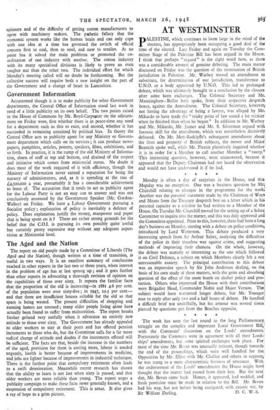AT WESTMINSTER
PALESTINE, which continues to loom large in the mind of the electors, has appropriately been occupying a good deal of the time of the elected. Last Friday and again on Tuesday the Com- mittee Stage of the Palestine Bill has been argued in the House. I think that perhaps " argued " is the right word here, as there was a considerable amount of genuine debating. The main matter discussed on Friday was the question of the termination of British jurisdiction in Palestine. Mr. Warbey moved an amendment to substitute, for determination of our jurisdiction, transference to U.N.O. or a body appointed by U.N.O. This led to prolonged debate, which was ultimately brought to a conclusion by the closure after some keen exchanges. The Colonial Secretary and Mr. Manningham - Buller both spoke, from their respective despatch boxes, against the Amendment. The Colonial Secretary, however, not having the advantage of being a lawyer, was alleged by Mr., Mikardo to have made the "tricky point of law sound a lot trickier when he finished than when he began." In addition to Mr. Warbey and Mr. Mikardo, Mr. Janner and Mr. S. Silverman argued with forensic skill for the amendment, which was nevertheless decisively, defeated. On Mr. Mott-Radclyffe's subsequent amendment abouti the lives and property of British subjects, the mover and Major' Beamish spoke well, while Mr. Piratin plaintively inquired whether, it is in order for a Member to call another Member a "twerp." This interesting question, however, went unanswered, because it appeared that the Deputy Chairman had not heard the observation and would not have understood it if he had.
* * * *
Monday is often a day of surprises in the House, and this Monday was no exception. One was a business question by Mr Churchill relating to changes in the programme for the week. Another was the personal statement made by the Chairman of Ways and Means from the Treasury despatch box on a letter which in his personal capacity as a solicitor he had written to a Member of the House. On Tuesday Mr. Churchill moved for the setting up of a Select Committee to inquire into the matter, and this was duly approved and the Committee appointed. Prior to this, however, there had been a long day's business on Monday, starting with a debate on police conditions,1 introduced by Lord Winterton. This debate produced a very interesting speech from Sir Arthur Salter, analysing the difficulties of the police in their truceless war against crime, and suggesting methods of improving their chances. On the whole, however,I the debate was scarcely as interesting as the one which followedl it on Civil Defence, a subject on which Members clearly felt a not unreasonable anxiety. The principal contribution to this debate was an impressive speech by Sir John Anderson dealing, on the basis of his own study of these matters, with the grim and absorbing,
question of the effect of the atom bomb on shelter policy and pro- tection. Others who impressed the House with their contributions were Brigadier Head, Commander Noble and Major Vernon. The subject would have warranted longer debate, but Mr. Younger rose to reply after only two and a half hours of debate. He handled a difficult brief not unskilfully, but his armour was several times pierced by questions put from the Benches opposite.
* * * * The week has seen the last round in the long Parliamentary' struggle on the complex and important Local Government Bill,1 with the Commons' discussion on the Lords' amendments.' Fortunately the Commons were in agreement with all their Lord- ships' amendments, but some spirited exchanges took place. For most of the time Mr. Bevan was unusually reticent, though towards the end of the proceedings, which were well handled for the Opposition by Mr. Elliot with Mr. Challen and others in support, he was stung to a more characteristic fieriness of utterance. With, the endorsement of the Lords' amendments the House might have thought that the matter had passed from their ken. But the next, day, Mr. Bevan came back. Homer, it appeared, had nodded, and fresh provision must be made in relation to the Bill. Mr. Bevan had his way, but not before being castigated, with caustic wit, by


































 Previous page
Previous page